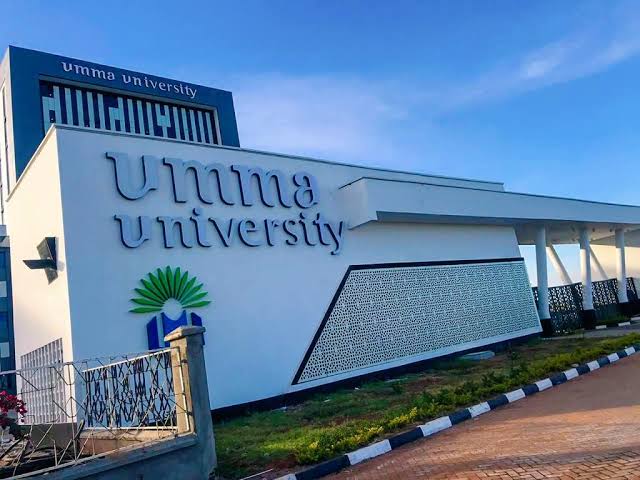The past few years have not been kind to Umma University.
The once-prestigious institution has seen its reputation plummet under the iron-fisted rule of Vice-Chancellor Dr. Halima Saado, who dismantled essential academic departments and chased away esteemed faculty.
The abolition of the research department was a shocking move that left many questioning the university’s commitment to academic excellence.
Meanwhile, staffing shortages across various schools have reached critical levels, with the School of Education struggling with a mere six full-time lecturers for nearly 1,000 students.
Nepotism and favoritism are the order of the day, with promotions seemingly granted based on loyalty rather than merit.
This culture of mediocrity seems to have no end in sight as more whispers of unfolding scandals swirl around Umma University.
WhatsApp messages that recently surfaced have exposed the depths of corruption plaguing Umma University, with Chancellor Mr. Abbas Gullet now dragged into the mess and accused of overstepping his ceremonial role by meddling in administrative affairs in an attempt to defend the embattled Vice-Chancellor Dr. Halima Saado.

Umma University officials during a past event
“It’s paramount for Mr. Gullet to understand his roles and functions as a Chancellor, which is a ceremonial position. Stick to your lane and your role and responsibility as clearly stipulated in the Umma University statutes,” reads one message circulating in an internal group of Umma University staff.
Financial stability claims by the university administration have been ruthlessly debunked by revelations of the university’s inability to replace over 40 departed employees and the reliance on part-time lecturers.
“How do you claim you’re financially stable when you have NOT replaced the EXODUS of over 40 employees and yet consider it as an income?” one aggrieved member questions.
Some of the messages criticize the university for relying heavily on part-time lecturers and failing to provide adequate health insurance, which is a clear sign of poor financial and workforce management.
“As a lecturer here, I find it hard to believe in financial stability when we have nearly 100 part-time lecturers and can’t seem to hire full-time staff. How does that add up?”
The university’s health insurance scheme is a mere corrupt arrangement that forces employees to pay exorbitant fees for basic consultations.
“We are forced to pay exorbitant fees through cartels just to get basic healthcare. It’s a slap in the face,” a frustrated staff member shared.

Umma University students ready to graduate
From the messages, it is clear that employees at Umma University are grappling with stagnant salaries devoid of yearly increments and a glaring absence of promotion opportunities.
Without regular salary adjustments and pathways for career advancement, staff members have been left questioning the institution’s ability to sustain itself while adequately supporting its workforce.
“Umma University is the only institution where salary is STATIC, no yearly increment under the guise of financial sustainability. How do you claim you’re financially stable when you cannot promote lecturers under the guise of financial sustainability?” another member questioned.
There is also growing attention on the procurement practices at Umma University.
The Vice-Chancellor, along with University Librarian Stella Migide, has been implicated in a corrupt scheme involving inflated prices for essential academic resources.
One staggering example includes the purchase of “Fasihi ya Uhakiki” at eight times the market value, resulting in significant financial losses.
Whistleblowers brave enough to expose these malpractices have faced vicious retaliation.
Reports of dismissals and unwarranted transfers paint a picture of an administration desperate to silence dissent and maintain its corrupt hold over the institution.
Dr. Halima, upon assuming office, implemented changes to the CIC Health Insurance Scheme, allegedly introducing terms detrimental to staff welfare.
A specific instance under the spotlight involves a procurement transaction at Umma University, detailed in LPO no. PO – 003571.
Invoice number 0008811 indicates an alarming discrepancy: an item priced at Ksh 164,395 was billed for a total of Ksh 493,185, raising serious questions about financial oversight and transparency at the institution.
“This is a well-known case of budgeted corruption in Kenya, orchestrated by CEOs collaborating with corrupt insurance companies, at the expense of UU staff. Reference to LPO no. PO – 003571 – Umma University. Invoice number: 0008811. Delivery note no. 000620. S/no. ISBN: 9789811686788.
Title: Encyclopedia of Teacher Education (2 Vol. Set)
Year: 2022
Price: 164,395 (1 copy)
Units: 3 copies
Total amount: 493,185.00
LPO ref: 3
That’s what she meant as FINANCIAL SUSTAINABILITY.
Successfully passed all the processes:
1. Done by the LIBRARIAN
2. Checked and confirmed by PROCUREMENT
3. Checked by FINANCE
4. Approved by VC
5. Accession No: 2023/16528.
This is pure corruption by the University Librarian and her cronies. 2022 was 1000 while 2023 was 7465. This is pure corruption by University Librarian Stella Migide.
This is 5200 from Amazon while it cost Ksh 164,000,” an insider within Umma University lamented.

An aerial view of Umma University
Adding insult to injury, the university’s infrastructure and services are in disrepair.
Environmental pollution caused by neglected sewage systems, inadequate student housing, and a lack of sports facilities is evident.
Students are forced to rent accommodations outside the university and buy water from vendors due to the lack of clean drinking water on campus.
As the allegations continue to mount, the calls for accountability are growing louder.
The Board of Trustees must launch a thorough investigation into these claims to restore the integrity of Umma University.
Vice-Chancellor Dr. Halima Saado and her cohorts must answer for their actions and the damage they have inflicted on this once-proud institution.



